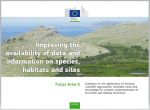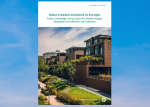Ecologic Institute Newsletter No 223 – April 2021
A brand new website – designed specifically for you!
- Ecologic Institute Newsletter
A brand new website – designed specifically for you!
Dear reader,
After months of hard work, we are proud to announce the relaunch of the Ecologic Institute's website. Just in time to celebrate our 25th year, we present a website that shows the people and projects that helped us to create a meaningful impact over the past quarter century.
Building on external and internal input as well as our strategic expertise, we have streamlined our content structure and created a more responsive interface with faster load times. Our website offers information about all of our projects and is growing every year! Over 900 projects, 1800 publications and hundreds of event summaries are now easier to find, filter and sort.
Not only have we significantly improved the functionality, we are also pleased to introduce you to our new look. Enjoy your explorations of our new website, check out our portfolio of work and learn more about the faces behind Ecologic Institute as we continue working towards a more sustainable world.
Yours sincerely,
Dr. Camilla Bausch
Director Ecologic Institute
Improvements in the Birds and Habitats Directives Implementation – Handbooks
Two new handbooks on Evidence-based Improvements in the Birds and Habitats Directives Implementation (E-BIND) are to advise the Commission, Member State authorities, decision makers, spatial planners, conservationists and NGOs in more effective implementation of the Nature Directives. The handbooks focus on guidance for improving the availability of data and information on species, habitats and sites (Focus area A) and scientific support for successful implementation of the Natura 2000 network (Focus area B). With their hands-on guidance for improving access to data and information the handbooks will contribute to the mobilization of the scientific community in order to close knowledge gaps and to offer solutions to strategic problems. Ecologic Institute's Dr. Grit Martinez and Beáta Welk Vargová led the development of the handbooks. The handbooks are available for download.
Nature-based Solutions for Climate Change Adaptation and Disaster Risk Reduction – Report
This European Environmental Agency report provides up-to-date information for policymakers on the how to apply nature-based solutions for climate change adaptation and disaster risk reduction and at the same time making use of multiple societal benefits that these solutions can bring. Drawing on selected examples across Europe, the authors, among them Ecologic Institute's McKenna Davis, show how impacts of extreme weather and climate-related events are already tackled in this way. It also assesses global and European policies and how nature-based solutions are increasingly being integrated in the efforts to shift towards sustainable development. The report is available for download.
Urban Nature: A Shared Solution to The Climate And Biodiversity Crises? – Policy Brief
This brief takes a critical look at the value and limits of climate nature-based solutions to deliver on biodiversity goals. Building on research findings from NATURVATION, an EU-funded Horizon 2020 project, the brief discusses the question: How can we realise the added value of urban climate nature-based solutions for biodiversity? The brief outlines pathways and recommendations for fostering multi-functionality in practice and points towards potential sources of funding that could be leveraged to promote investment in nature-based solutions to reduce climate risks. The policy brief is available for download.
Effects of the Existing Tenant Electricity Systems in Berlin – Study
Tenant electricity systems generate solar power on apartment buildings and deliver it directly to the households in the building. In a new study, Katharina Umpfenbach and Ricarda Faber (Ecologic Institute) evaluate the effects of the existing tenant electricity systems in Berlin. The bottom line: Berlin's 74 tenant electricity projects have positive ecological and socio-economic effects, but these remain low compared to the technically available potential. Currently, only 1 % of the tenant electricity potential is used. The study is available for download.
Subsoil Amelioration as a Strategy to Adapt to Climate Change? – Article
Drought events increasingly affect the agricultural sector in Europe. The subsoil could play an important role for agricultural climate adaptation strategies. As part of the Soil³ research project, Ecologic Institute investigated farmers' and other soil experts' acceptance of measures that enhance the subsoil. The results have been published in the Journal Frontiers in Agronomy and are freely accessible.
A "Fit for 55" Package Based on Environmental Integrity and Solidarity – Study
The EU has raised its climate target for 2030 to at least -55 % and is now debating how to reform its climate policy architecture so that it can reach it. In a new study, Agora Energiewende and Ecologic Institute sketch a "Fit for 55" package that can ensure both environmental integrity and solidarity. It investigates four options how to regulate heating and transport emissions, focusing in particular on the pros and cons of expanding emissions trading to these sectors. The study makes the case for a smart mix of EU-level carbon pricing and companion polices. The study is available for download.
Fitting European Climate Protection Measures into the Global Framework – Article
In the context of the European Green Deal, the introduction and design of border adjustment measures is currently subject to much controversy. Upon invitation to contribute to the series "Green Deal reloaded" by the Stiftung Genshagen and the Institut Montaigne, Dr. Camilla Bausch (Ecologic Institute) analyzes the opportunities and challenges provided by the proposed border adjustment mechanism. The article is available for download.
Options for Multilateral Initiatives to Close the Global 2030 Climate Ambition and Action Gap – Policy Brief
This policy brief identifies four options for increased multilateral cooperation that support an international shift towards sustainable food systems and help to increase the global 2030 climate ambition at the same time. The identified initiatives focus on activities that reduce food loss and waste and support plant based diets, following a 'food systems approach.' Moreover, the policy brief authors, among them Ecologic Institute's Stephanie Wunder, present an overview of existing partnerships, alliances and networks at the international level that illustrates on which existing international activities one can already build on. The policy brief is available for download.
Conference on the Future of Europe – Document
The Conference on the Future of Europe begins on 9 May 2021. The conference has great importance for EU climate policies. As a contribution to the start of the conference, think tanks from Bulgaria, the Czech Republic, Estonia, Germany, Hungary, Italy, Romania, and Poland make recommendations on how EU climate policy and the Conference on the Future of Europe can be mutually beneficial. The document is available for download.
International Conference on Fishfriendly Hydropower
The final online conference of the FIThydro project brought together over 280 participants from across the globe to explore the latest research developments on the topic of sustainable and fish friendly hydropower showcasing the project's final results in addition to presentations by experts from outside the project on related topics. The online conference was hosted by Ecologic Institute and the Technical University of Munich. The presentations slides and recordings are available online.
Addressing Climate Change in European Supply Chains – COACCH Workshop
As a part of the COACCH project, Ecologic Institute, University of Graz and Deltares organized a workshop with stakeholders and interested parties on the topic of "Addressing climate change in European supply chains". The COACCH project is analysing climate change impacts such as floods, high temperatures, and water availability and adaptation responses in manufacturing industries, supply chains and intermodal transport hubs. The workshop was held on 19 March 2021 in a virtual format, and welcomed more than 20 participants from seven European countries. The participants covered a range of stakeholders including researchers, representatives from companies and industry associations, as well as public authorities. The workshop's background paper and the presentation slides are available for download.
Announcing our Sponsor a Scientist Crowdfunding Initiative
On Monday, 3 May 2021, Ecologic Institute will launch its first crowdfunding campaign. We have partnered with betterplace.org to fund a new International Fellowship to focus on the pressing subject of health & climate. The Stiftung Mercator has generously offered to match every Euro you donate with one of their own until we reach our goal of 25000 € - 1000 € for each of our 25 years.
INTERLACE Project Officially Launched in Partner Cities
The six city partners of the INTERLACE project Chemnitz in Germany, Corredor Biológico Interurbano Río María Aguilar-San José in Costa Rica, Envigado in Colombia, Granollers in Spain, Metropolia Krakowska in Poland and Portoviejo in Ecuador officially kicked off the project's activities in their cities in a series of events conducted across March 2021.
The Urban Agenda for the EU, its 'Green' Actions and the European Green Deal
The European Urban Knowledge Network's (EUKN) Policy Lab on "The Urban Agenda for the EU, its 'green' actions and the European Green Deal" aimed to unravel the 'green' actions of the Urban Agenda for the EU and develop concrete messages on how to support cities dealing with regulatory obstacles when trying to reach environmental goals. McKenna Davis spoke at the nature-based solutions session, offering insights on how to overcome obstacles faced by cities in mainstreaming and implementing nature-based solutions. She highlighted pathways for moving NBS from niche to mainstream to address climate change, biodiversity loss, economic regeneration, social inclusion and the sustainable development goals agenda. Each pathway was underlined by 'stepping stones', which highlight actions in the areas of policy, finance or urban development.
Contents
- Publications
- Improvements in the Birds and Habitats Directives Implementation – Handbooks
- Nature-based Solutions for Climate Change Adaptation and Disaster Risk Reduction – Report
- Urban Nature: A Shared Solution to The Climate And Biodiversity Crises? – Policy Brief
- Effects of the Existing Tenant Electricity Systems in Berlin – Study
- Subsoil Amelioration as a Strategy to Adapt to Climate Change? – Article
- A "Fit for 55" Package Based on Environmental Integrity and Solidarity – Study
- Fitting European Climate Protection Measures into the Global Framework – Article
- Options for Multilateral Initiatives to Close the Global 2030 Climate Ambition and Action Gap – Policy Brief
- Conference on the Future of Europe – Document
- Events
- International Conference on Fishfriendly Hydropower
- Addressing Climate Change in European Supply Chains – COACCH Workshop
- News
- Announcing our Sponsor a Scientist Crowdfunding Initiative
- INTERLACE Project Officially Launched in Partner Cities
- The Urban Agenda for the EU, its 'Green' Actions and the European Green Deal


